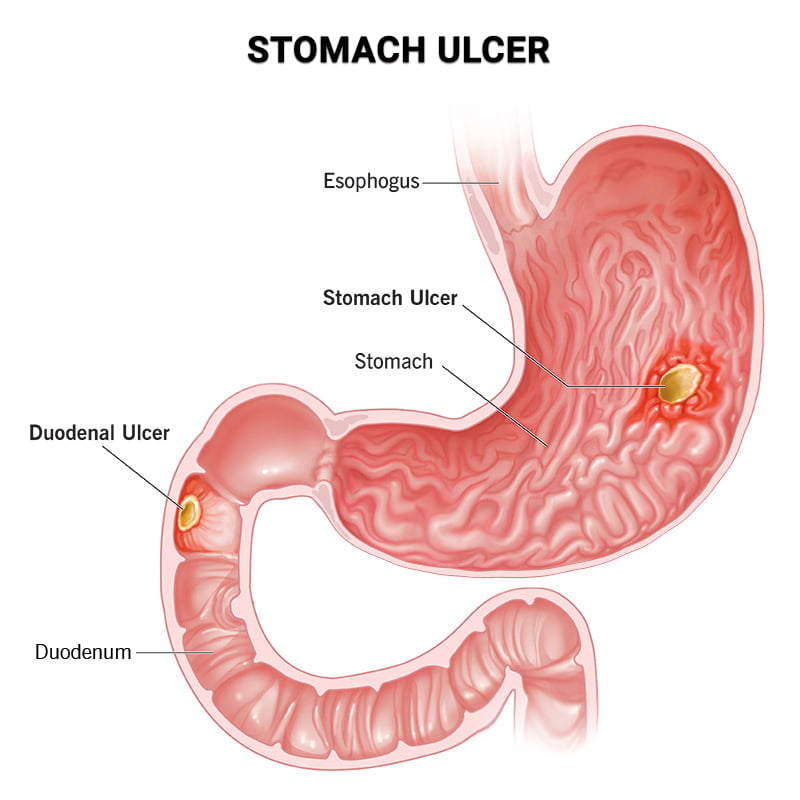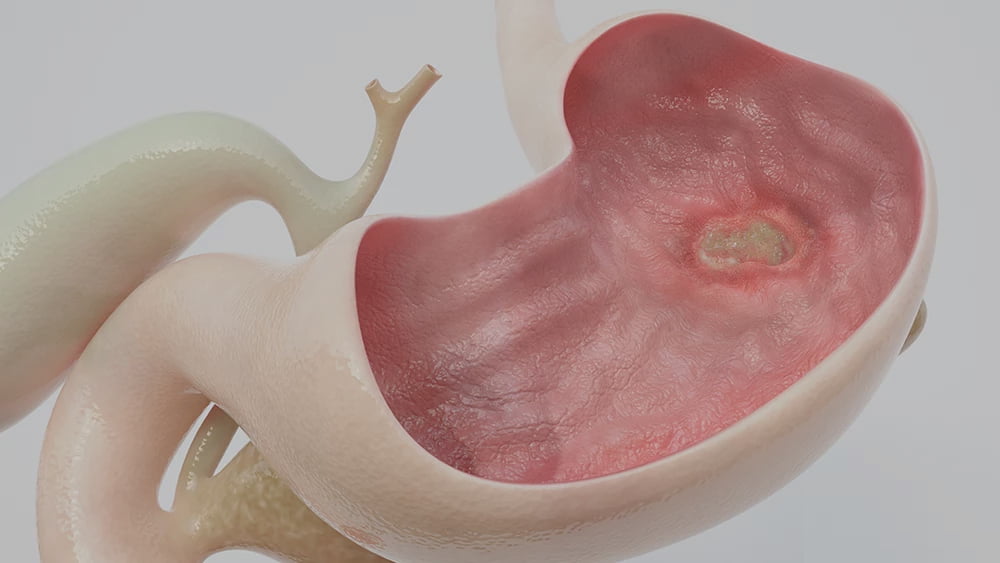If you have been suffering from dull, yet persistent pain in the abdominal region, frequent heartburn, nausea and vomiting, and a change in your stool color, you may have an ulcer. Understanding the warning signs and symptoms of ulcers is crucial for getting the best medical assistance you need to stay healthy and prevent further complications. The board-certified doctors at the Manhattan Gastroenterology have the knowledge and the skills to diagnose and treat stomach ulcers most efficiently. The expert GI doctors can help you recognize the warning signs of an ulcer and focus on how to deal with them the right way. They strive to provide relief from the difficult symptoms with the best solutions, specifically designed for your specific condition.
What Are Stomach Ulcers?
Ulcers are sores on the lining of the stomach or small intestine. These sores could also be on the esophagus or throat. Stomach ulcers are a common condition that affects a large population. Symptoms of ulcers can be mild to severe depending on your lifestyle, habits, and the size of the ulcers.

In some cases, ulcers can erode the blood vessel wall on the stomach, small intestine or eat a hole through the lining and get an infection. They can also cause swelling, which blocks the food from moving from the stomach into the small intestine.
Some ulcers heal on their own, but they may come back if you are not careful. They can be cured when detected timely, but if they are left untreated for long, they can become serious and even require surgery to get rid of the debilitating symptoms. In extreme cases, complications from stomach ulcers can even be fatal.
There are two kinds of stomach ulcers. They are:
- Gastric ulcers – they are sores on the lining of your stomach
- Duodenal ulcers – they are sores on the upper section of your small intestine
Causes of Ulcer?
When we eat, our stomach produces hydrochloric acid and an enzyme called pepsin to digest the food. The food is partially digested in the stomach and then moves to the duodenum to continue the process.
The body creates a protective layer of mucus to shield the linings of the stomach and small intestine from the harsh acid that helps break down the food. When the mucus layer is worn away or fails to function normally, the acid begins to damage the stomach lining or small intestine, creating ulcers. Spicy food and stress are believed to cause ulcers, but while they can intensify them, they are not the actual causes.
Other causes of ulcers include the following:
- An infection from a common bacteria called Helicobacter pylori
- Long term use of nonsteroidal anti-inflammatory drugs, such as aspirin or ibuprofen
- Excessive smoking
- Use of steroids
- Frequent alcohol use
- Family history of ulcers
- Being older than 50 years
5 Signs of an Ulcer
The signs of a stomach ulcer can range from mild to severe. Here are the top 5 signs that indicate the presence of an ulcer:
Dull, Burning Pain in the Abdomen

The most common sign of a stomach ulcer is a dull, persistent burning pain in the abdominal area. This sensation occurs when juices in the stomach used for digestion come into contact with the open sore. The pain mostly strikes between meals when the stomach is empty. It may only last for a few minutes, or it could last for hours, depending on the size and severity of the ulcer.
For the most part, the pain is felt from the breastbone to the navel. It is worse at night than during the day. People who skip meals frequently experience this pain during the daytime too. It has been observed that food, liquids, and antacids can relieve this pain temporarily.
It is essential to know that if the dull, burning ache turns into a sharp or stabbing pain, immediate medical help is crucial. It could mean that the ulcer has caused a critical problem like a perforation in the stomach wall or intestines or a blockage in the digestive tract, and it needs emergency treatment.
Indigestion or Heartburn
Ulcers can increase the feelings of indigestion or heartburn, a burning sensation near your heart, or an upset stomach that happens when the stomach acid flows up the esophagus. When the lower esophageal sphincter does not close all the way or opens too frequently, stomach acid can move up into the esophagus. It results in acid reflux and can cause severe heartburn and an urge to throw up.
If you notice increased episodes of indigestion or heartburn, a stomach ulcer could be the culprit behind it.
Nausea or Vomiting
Another clue that you are suffering from a stomach ulcer is vomiting and nausea. The ulcers can make your feel sick to your stomach, especially in the morning after going a long time without food. Ulcers trigger an inflammatory response in the stomach, which lead to contractions. When they get strong enough, you will experience vomiting. If you are vomiting, chances are you were already feeling nauseous for a while. Nausea usually occurs early in the morning, but it may subside once the vomiting episodes begin.
In some cases, blood in the vomit is also prominent. The presence of blood in the vomit is scary, and you should go directly to the hospital. Contrary to what you may think, stomach ulcers do not result in bright red bloody vomit. Most often ulcers cause your vomit to look similar to coffee grinds, which means they will be dark brown.
Change in Stool Color
If you notice a change in your stool color, it may be a sign that you have an ulcer. Your stool may turn dark in color or even black, the color of digested blood due to ulcer bleeding. Bleeding ulcers are a serious risk to health and need urgent medical attention.
Unexplained Weight Loss
Another sign that you may have a stomach ulcer is loss of appetite, which will most likely lead to weight loss. When your stomach lining is damaged, it results in inflammation and the formation of scar tissues that block the food passageway and cause potential swelling in the small intestines. This will make you feel as if you are full even if you have not eaten anything.
If you continue to feel this way, you may end up with a decreased appetite, eating less, and unexplained weight loss in the long run. It is essential to eat well and get the necessary nutrients that your body needs to function normally.
How to Know If You Have an Ulcer?
The only way to be sure that an ulcer is causing your discomfort is with the help of a medical diagnosis. Pain in the abdomen, nausea or vomiting, heartburn, and change in stool color could be an outcome of any other gastrointestinal condition, which often makes it difficult for you to determine their exact causes.
The doctor will evaluate your medical history and conduct a physical examination to analyze your symptoms and make an accurate diagnosis. You may be asked to get your blood, stool, or breath tested as these investigations are designed to look for signs of Helicobacter pylori, the bacteria linked to ulcers.
Depending on your symptoms and their severity, the doctor may also recommend an endoscopy. An endoscopy is a procedure in which a tube with a tiny camera is passed down your throat to the stomach to search for potential damage and collect tissue samples for analysis.
Treating Ulcers
The primary goal of ulcer treatment is to reduce the amount of acid in the stomach and strengthen the protective lining that comes in direct contact with stomach acids.
Treatment for ulcers also depends on their causes. If Helicobacter pylori bacteria is causing the infection, the doctor will prescribe medications, including antibiotics, to get rid of the bacteria. In most cases, medications reduce the levels of acid in the stomach to heal the ulcers and help you feel better.
Your doctor may recommend:
- H2 receptor blockers, drugs that also block acid production
- Stopping the use of all NSAIDs
- Follow-up endoscopy to keep an eye on the stomach lining
- Probiotics to get rid of H. Pylori
- Bismuth supplements that cover the ulcer and protect it from stomach acid
Treatments for ulcers also include lifestyle changes such as:
- Eliminating certain foods
- Avoiding alcohol
- Practicing stress management
If medications are unable to control your ulcers, surgery may be necessary. The gastro doctor will work with you to create a treatment plan for your situation and come up with solutions that accelerate healing and help you recover quickly.
What Does a Stomach Ulcer Feel Like?
Stomach ulcers are recognized by the pain that usually begins in the upper middle part of the abdomen, above the belly button, and below the breastbone. Stomach acid on an empty stomach can worsen the pain.
Ulcers do not always cause symptoms, but a serious complication such as bleeding or a sudden, bad upper abdominal pain is the first sign of an ulcer. If you recognize the signs and symptoms, schedule an appointment to see your doctor before things turn bad. A stomach ulcer does not get better on its own, and you need medical help as soon as possible to prevent the stomach lining from further damage.
The gastro specialists at
Manhattan Gastroenterology have years of experience and expertise in treating chronic and irritating peptic ulcers. They know the conditions that lead to ulcers or aggravate them and provide quick relief from debilitating pain that is disturbing your normal life. They strive to heal your ulcers completely with the best options and ensure they do not come back and irritate you again.

